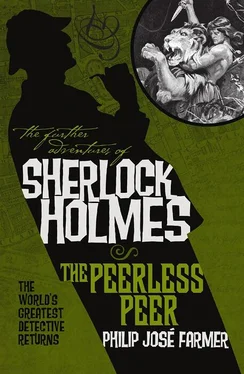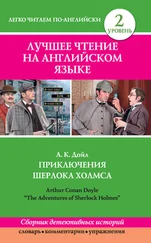I wondered what Merrivale was doing away from the War Office but had no opportunity to voice my question. The sight of the second person there startled me at the same time it delighted me. It had been over a year since I had seen that tall, gaunt figure with the greying hair and the unforgettable hawklike profile.
“My dear Holmes,” I said. “I had thought that after the Von Bork affair...”
“The east wind has become appallingly cold, Watson,” he said. “Duty recognises no age limits, and so I am called from my bees to serve our nation once more.”
Looking even more grim, he added, “The Von Bork business is not over. I fear that we underestimated the fellow because we so easily captured him. He is not always taken with such facility. Our government erred grievously in permitting him to return to Germany with Von Herling. He should have faced a firing squad. A motor-car crash in Germany after his return almost did for us what we had failed to do, according to reports that have recently reached me. But, except for a permanent injury to his left eye, he has recovered.
“Mycroft tells me that Von Bork has done, and is doing, us inestimable damage. Our intelligence tells us that he is operating in Cairo, Egypt. But just where in Cairo and what disguise he has assumed is not known.”
“The man is indeed dangerous,” Mycroft said, reaching with a hand as ponderous as a grizzly’s paw for his snuff-box. “It is no exaggeration to say that he is the most dangerous man in the world, as far as the Allies are concerned, anyway.”
“Greater than Moriarty was?” Holmes said, his eyes lighting up.
“Much greater,” replied Mycroft. He breathed in the snuff, sneezed, and wiped his jacket with a large red handkerchief. His watery grey eyes had lost their inward-turning look and burned as if they were searchlights probing the murkiness around a distant target.
“Von Bork has stolen the formula of a Hungarian refugee scientist employed by our government in Cairo. The scientist recently reported to his superiors the results of certain experiments he had been making on a certain type of bacillus peculiar to the land of the Pharaohs. He had discovered that this bacillus could be modified by chemical means to eat only sauerkraut. When a single bacillus was placed upon sauerkraut, it multiplied at a fantastic rate. It would become within sixty minutes a colony which would consume a pound of sauerkraut to its last molecule.
“You see the implications. The bacillus is what the scientists call a mutated type. After treatment with a certain chemical both its form and function are changed. Should we drop vials containing this mutation in Germany, or our agents directly introduce the germs, the entire nation would shortly become sauerkrautless. Both their food supply and their morale would be devastated.
“But Von Bork somehow got wind of this, stole the formula, destroyed the records and the chemicals with fire, and murdered the only man who knew how to mutate the bacillus.
“However, his foul deed was no sooner committed than detected. A tight cordon was thrown around Cairo, and we have reason to believe that Von Bork is hiding in the native quarter somewhere. We can’t keep that net tight for long, my dear Sherlock, and that is why you must be gotten there quickly so you can track him down. England expects much from you, brother, and much, I am sure, will be given.”
I turned to Holmes, who looked as shaken as I felt. “Surely, my dear fellow, we are not going to Cairo?”
“Surely indeed, Watson,” he replied. “Who else could sniff out the Teutonic fox, who else could trap him? We are not so old that we cannot settle Von Bork’s hash once and for all.”
Holmes, I observed, was still in the habit of using Americanisms, I suppose because he had thrown himself so thoroughly into the role of an Irish-American while tracking down Von Bork in that adventure which I have titled “His Last Bow.”
“Unless,” he said, sneering, “you really feel that the old warhorse should not leave his comfortable pasture?”
“I am as good a man as I was a year and a half ago,” I protested. “Have you ever known me to call it quits?”
He chuckled and patted my shoulder, a gesture so rare that my heart warmed.
“Good old Watson.”
Mycroft called for cigars, and while we were lighting up, he said, “You two will leave tonight from a Royal Naval Air Service strip outside London. You will be flown by two stages to Cairo, by two different pilots, I should say. The fliers have been carefully selected because their cargo will be precious. The Huns may already know your destination. If they do, they will make desperate efforts to intercept you, but our fliers are the pick of the lot. They are fighter pilots, but they will be flying bombers. The first pilot, the man who’ll take you under his wing tonight, is a young fellow. Actually, he is only seventeen, he lied to get into the service, but officially he is eighteen. He has downed seven enemy planes in two weeks and done yeoman service in landing our agents behind enemy lines. You may know of him, at least you knew his great-uncle.”
He paused and said, “You remember, of course, the late Duke of Greystoke?” [1] This is the line in which Watson inadvertently wrote “Holdernesse” but corrected it. Editor.
“I will never forget the size of the fee I collected from him,” Holmes said, and he chuckled.
“Your pilot, Leftenant John Drummond, is the adopted son of the present Lord Greystoke,” Mycroft continued.
“But wait!” I said. “Haven’t I heard some rather strange things about Lord Greystoke? Doesn’t he live in Africa?”
“Oh, yes, in darkest Africa,” Mycroft said. “In a tree house, I believe.”
“Lord Greystoke lives in a tree house?” I said.
“Ah, yes,” Mycroft said. “Greystoke is living in a tree house with an ape. At least, that’s one of the rumours I’ve heard.”
“Lord Greystoke is living with an ape?” I said. “A female ape, I trust.”
“Oh, yes,” Mycroft said. “There’s nothing queer about Lord Greystoke, you know.” [2] Under normal circumstances your editor would delete this old joke. Doubtless the reader has heard it in one form or another. But it is Watson’s narrative, and it is of historical importance. Now we know when and where the story originated.
“But surely,” I said, “this Lord Greystoke can’t be the son of the old duke? Not the Lord Saltire, the duke’s son, whom we rescued from kidnappers in the adventure of the Priory School?”
Holmes was suddenly as keen as an eagle that detects a lamb. He stooped toward his brother, saying, “Hasn’t some connexion been made between His Grace and the hero of that fantastic novel by that American writer — what’s-his-name? — Bayrows? Borrows? Isn’t the Yank’s protagonist modelled somewhat after Lord Greystoke? The book only came out in the States in June of 1914, I believe, and so very few copies have gotten here because of the blockade. But I’ve heard rumours of it. I believe that His Grace could sue for libel, slander, defamation of character and much else if he chose to notice the novel.”
“I really don’t know,” Mycroft said. “I never read fiction.”
“By the Lord Harry!” Merrivale said. “I do! I’ve read the book, a rattling good yarn but wild, wild. This heir to an English peerage is adopted by a female ape and raised with a tribe of wild and woolly...”
Mycroft slammed his palm against the top of the table, startling all of us and making me wonder what had caused this unheard-of violence from the usually phlegmatic Mycroft.
“Enough of this time-wasting chitchat about an unbalanced peer and an excessively imaginative Yankee writer!” he said. “The Empire is crumbling around our ears and we’re talking as if we’re in a pub and all’s well with the world!”
Читать дальше












